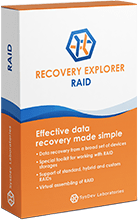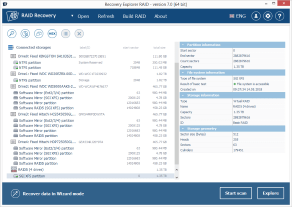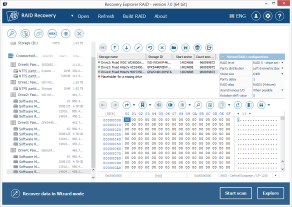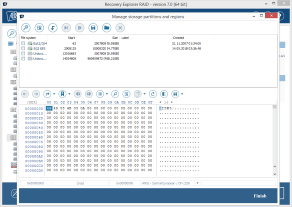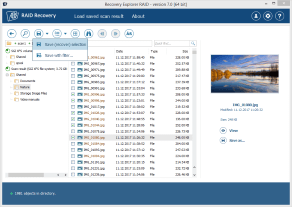Recovery Explorer RAID

Recovery Explorer RAID is an efficient software tool aimed at data recovery from various digital media, among which are common storage devices, like hard disk drives or USB sticks, and RAID sets of different configurations that may be implemented independently or as a part of NAS/DAS. Enhanced with a variety of auxiliary features and an optional Wizard-based mode, this cross-platform software offers a smooth and maximally straightforward data recovery procedure, irrespective of the storage complexity.
A broad scope of data loss cases addressed by a single instrument

deletion

corruption

formatting
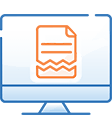
crashes

attacks
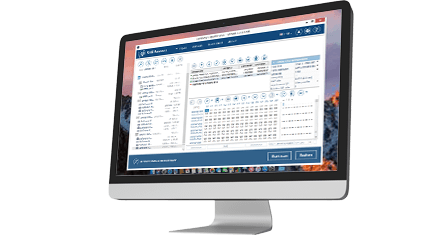
- PCs/laptops
- Hard disk drives
- External USB disks
- USB flash drives
- Memory cards
- Music players
- Digital cameras
- RAID sets
- NAS devices
- Servers
- Other storage devices
 Documents
Documents Images
Images
 Audio files
Audio files Videos
Videos
 E-mails
E-mails Any other file format
Any other file format
Key features
With Recovery Explorer RAID, it is possible to get the missing data back from personal computers, external hard disks, memory cards, thumb drives, RAID sets and other storages with various file systems of Windows (FAT/FAT32/exFAT and NTFS), macOS (HFS+, APFS) and Linux (Ext2/Ext3/Ext4, ReiserFS, XFS, JFS, IBM JFS2, UFS/UFS2). Moreover, the software provides direct access to the undamaged content of volumes, helping to solve the problem of incompatibility between the storage format and the OS.
The program can handle a wide range of RAID configurations, among which are standard levels (RAID 0, RAID 1, RAID 1E, RAID 3, RAID 5, RAID 6, etc.), combined patterns (RAID 10, RAID 50, RAID 60, RAID 50E, etc.), specific technologies (Btrfs-RAID, Synology SHR) and custom RAID layouts. The software detects RAID metadata on the drives and is capable of interpreting it for the automatic assembly of an intact array.
The application supports many technologies that can be employed by modern storages, like Windows Dynamic Disks and Storage Spaces, Apple Software RAID and APFS-based Fusion Drive, Linux mdadm and LVM, virtual disks created by popular virtualization systems, including VMware, Hyper-V, VirtualBox, QEMU, XEN and others, along with different formats of disk images.
Recovery Explorer RAID offers multiple scanning options, including a quick scan for specified file system types, a longer in-depth search for lost data by known content with an option to load custom IntelliRAW rules, scanning of the space occupied by a particular file system or just the “free space” regions. It is possible to pause the operation at any moment, check the intermediate results or save them for later references.
The utility is complemented with various useful tools and options, for instance, an embedded viewer for files of most common formats, an advanced search function with several criteria, the possibility to filter the found items by the date, size or name, a basic instrument for creating disk images and a monitor for the S.M.A.R.T status of the connected drives.
Recovery Explorer RAID is a combination of professional data recovery techniques and a user-friendly interface which makes the software accessible for users without specialized technical skills. The optional simplified mode (Wizard-based mode) offers guidance through the whole procedure by showing useful tips and prompts, providing the possibility to recover data in several elementary steps.
What's New in Version 10.18
- RAID metadata support: added one more variation of SilImage RAID metadata;
- Microsoft Storage Spaces:
- Fixed issue with support of cache volumes with sector size 4KB;
- Added support of volume metadata version 17 (Win11 25H2);
- Added tool for accessing ZFS file system transactions;
- Support of archives:
- Added support of LZMA2 decompression;
- Added read support of .xz archives;
- Added read support of .xar archives;
- In the embedded file viewer:
- Added preview of newly supported types of archives;
- Added extraction of preview picture for 3MF and F3D model formats;
- Also fixed a couple of issues with proper displaying of texts (such as 'Error', 'Loading...' etc.);
- NTFS file system scan:
- Fixed issue that prevented running a full 'quick' scan in some scenarios;
- Updated transaction log (journal) analysis procedure for better recovery of deleted files in some scenarios;
- FAT/FAT32 scan: updated for better file system structure recovery in some scenarios.
Frequently asked questions
-
You can download the free Trial version of Recovery Explorer RAID from this webpage and use it to make sure that the product corresponds to your requirements. The trial software will present all the recovered data and allow copying files with a size of less than 768 KB. Copying bigger files requires activation of the software license.
-
UFS Explorer RAID Recovery may serve as a perfect alternative to Recovery Explorer RAID for specialists in the field of data recovery. Please refer to the comparison page to find out the difference in the functional capabilities of these product editions and decide which of them is a better match to your needs.
-
A license should be selected in accordance with the intended use of the software. The Personal License can be used by a single individual only for personal or educational purposes on home PCs or one computer at work. The Corporate License can be used on up to ten computers owned by a legal entity, company or organization for corporate non-profit or educational purposes. The Commercial License can be used on one computer owned by a legal entity, company or organization for commercial purposes and providing services. For more detailed information please refer to the software license page.
-
The license for the software will be provided after a one-time payment of the corresponding license fee. To place an order use the "Buy License" button on this webpage or the "Order license" button from the "Software Activation and License" dialog in the software interface. Choose the needed license type and the operating system you are going to use for the installation of the software. Please note that a single license is applicable for a specific version of the product for one operating system (e.g. Windows OS, both 32-bit and 64-bit) and running the software in other environments requires activating different software licenses. Press "To Checkout" and fill out the billing form. The information needed for the purchase includes first name, last name, address, city, country and email address. All the data and the transaction will be securely processed by our sales partner 2Checkout according to the market security standards.
-
Our sales partner 2Checkout provides a variety of payment options, including Visa/MasterCard, PayPal, American Express, Discover, WebMoney, wire transfer, etc. and allows performing the payment in any currency. For more details, please, visit the global payments page on their website.
-
A Registration Code is issued to either the person's (entrepreneur’s) name or company's name once the payment is processed and is delivered to the email address specified in the order. The delivery is electronic and usually takes about 15-45 minutes.
-
A Registration Code will be sent to the email address specified in your purchase order. To activate the license, download a free Trial version of the software and enter your name with the Registration Code from the email in the "Software Activation and License" dialog.
-
Download the updated version of Recovery Explorer RAID from this webpage and follow the steps of "fresh" software installation. Alternatively, you can do that by following the prompts in the software interface.
Other Recovery Explorer products
-
NTFS, FAT, FAT32, exFAT, ReFS/ReFS3;
-
HFS+, APFS;
-
Ext2, Ext3, Ext4, XFS, Extended format XFS, JFS, ReiserFS, UFS, UFS2, Adaptec UFS, big-endian UFS, Sun ZFS, Btrfs.
-
NTFS:
full support: data access, search for lost partitions, RAID recovery, recovery of deleted files, recovery after formatting and file system damage. -
FAT/FAT32/exFAT:
full support: data access, search for lost partitions, recovery of deleted files, recovery after formatting and file system damage. -
ReFS/ReFS3:
full support: data access, search for lost partitions, RAID recovery, recovery of deleted files, recovery after formatting and file system damage. -
XFS:
full support: data access, search for lost partitions, RAID recovery, recovery of deleted files, recovery after formatting and file system damage; support of NAS devices and custom servers. -
Apple HFS+:
full support: data access, search for lost partitions, RAID recovery, recovery of deleted files, recovery after file system damage. -
APFS:
full support: data access, search for lost partitions, RAID recovery, recovery of deleted files, recovery after file system damage. -
Linux JFS:
full support: data access, search for lost partitions, RAID recovery, deleted files recovery, recovery after format and file system damage. -
Ext2-Ext4:
full support: data access, search for lost partitions, RAID recovery, recovery of deleted files, recovery after file system damage; support of NAS devices and custom servers. -
ReiserFS:
full support: data access, search for lost partitions, RAID recovery, recovery of deleted files, recovery after formatting and file system damage. -
Btrfs:
full support: data access, search for lost partitions, RAID recovery, deleted files recovery, recovery after format and file system damage. -
UFS/UFS2:
data access, search for lost partitions, RAID recovery for both little-endian and big-endian variations; recovery after file system damage; very limited recovery of deleted files.
-
Composite volumes: mdadm, LVM, LDM, Apple Software RAID, Intel Matrix;
-
Most standard RAID patterns: RAID 0, RAID 1E, RAID 3, RAID 4, RAID 5, RAID 6, etc.;
-
Nested (Hybrid) RAID levels: RAID 10, RAID 50, RAID 60, RAID 50E, etc.;
-
Non-standard RAID: Synology Hybrid RAID, Btrfs-RAID;
-
Custom RAID patterns: via RAID Definition Language or Runtime VIM.
-
Virtual disks and disk images: VMware (VMDK), Hyper-V (VHD/VHDX), QEMU/XEN (QCOW/QCOW2), VirtualBox (VDI), EnCase (E01 and Ex01 non-encrypted), Apple Disk Images (DMG), disk images of DeepSpar DDI, R-Studio image files (RDR), simple disk images;
-
Other storage technologies: Microsoft Storage Spaces, Fusion Drive (based on APFS).
-
Tools for low-level data analysis: hexadecimal viewer (for storages, partitions and files);
-
Features for work with damaged disks: basic disk imager, S.M.A.R.T. monitor for drives, event log;
-
Auxiliary options: files preview, search, sorting, filtering and others.
-
The software will copy files the size of which doesn’t exceed 768 KB.
-
Microsoft Windows ®: starting from Windows® XP with Service Pack 3 and later;
-
macOS: all versions starting from 11;
-
Linux: Debian Linux 6.0 (or compatible) and above.
-
Intel Architecture, 32-bit (IA-32, x86);
-
AMD64 (x86-64);
-
Apple Silicon (arm64).
-
Any of the supported host operating systems;
-
at least 20 MB of free space on the disk for the executable files of the software;
-
at least 1 GB of RAM;
-
the Linux software version can run from most modern Linux Live CDs.
-
A 64-bit edition of any of the supported host operating systems;
-
over 1 GB of free space on the disk for the program and temporary files;
-
at least 2 GB of RAM and 4 logical cores CPU;
-
any web browser.
